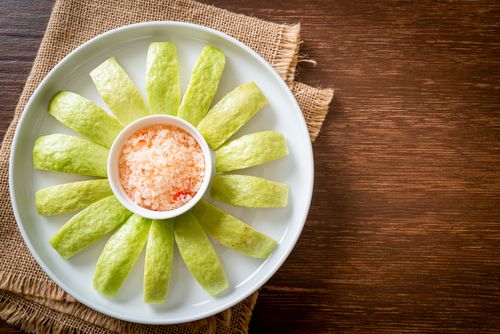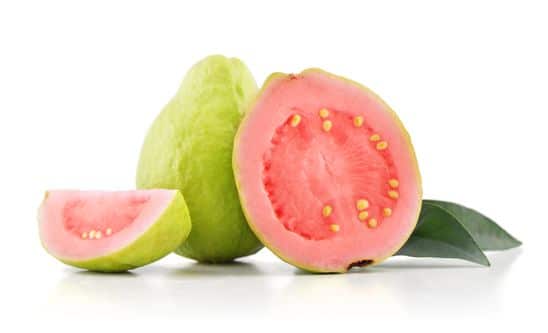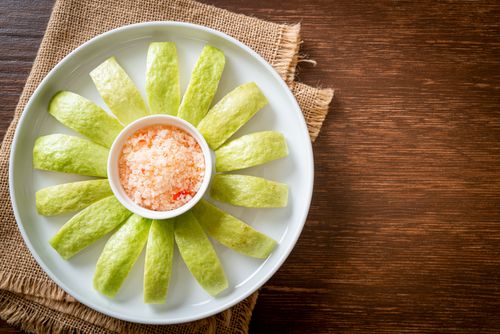
Guava is a tropical fruit with its origin in Central America, Mexico, and the Caribbean. There are some species of guavas like pineapple guava and apple guava. Apple guavas generally go by the name ‘guava’ and are the most common type.
It is a small fruit known botanically as Psidium Guajava. The skin of the fruit is a pale yellow to light green. The flesh varies in color from white to pink. The seeds and the leaves of guavas are edible. India is one of the major cultivators of this fruit today.
Physical Structure of a Guava
Guava belongs to a family of dicotyledonous plants called the myrtle family. The plants have dark green leaves of 5 to 15 cm in length. The guava flowers are white with multiple stamens. Guavas are about 4 to 12 cm in length. They have a sweet fragrance that is comparable to a subtle aroma of lemon rind. When ripe, the outer skin becomes soft and the pulp inside has a sweet taste.
Uses of Guava
Many cuisines use guava for their juice. Agua Fresca is a popular guava juice used in Latin American countries. Sauces, candies, and snacks use this juice to enhance the flavor. Sauces and other pickled food items use red guavas in particular to mimic the flavor of tomatoes.
Guavas contain high amounts of pectin whose main component is sugar. So, this makes guavas a good option for candies, jams, and jellies. Guava pulp makes for a great flavor in ice creams and milkshakes. The guava leaves are edible in the form of herbal teas and supplements.
Where in India is Guava Popular?
The climatic condition of India makes it an ideal place for growing guava. Hence, guavas are one of the top four fruits cultivable here. Uttar Pradesh and Maharashtra are the top guava-growing states. Bihar, Tamil Nadu, and Andhra Pradesh closely follow the list. The guava season varies depending on each state and its crop patterns. The last four decades show a 55% increase in guava production in India.
Sardar and Allahabad Safeda are two of the most famous guava types in India. They are of great quality and are high-yielding. Vijayawada and Nuzvid are some of the major cultivators of the Sardar or Lucknow variety. The Allahabad variety finds its majority cultivators in Odugathur, Madurai, and Theni. Some of the other guava varieties are Lalit, Dhareedar, Safed Jam, etc.
Nutritional Facts of Guava
100 grams of guava contains the following nutrients:
- Calories: 68 kcal
- Carbohydrates: 14.32 g
- Sugar: 8.92 g
- Fibre: 5.4 g
- Protein: 2.55 g
- Fat: 0.95 g
The calorie content of a serving of guava is reasonable considering its immense goodness. It has a very minimal fat content and is rich in fibre and proteins. The sugar content gives guavas their unique sweetness.
Guava is a powerhouse of vitamins. Unlike orange or amla, guava is lesser-known but highly rich in vitamin C. 100 grams contains close to 230 mg of vitamin C. It makes up about 23.5% of the daily value. Vitamin B is another prominent vitamin in guavas. Folate (B9) and pantothenic acid (B5) content make up 12 and 9% respectively of the daily value. Other vitamin B constituents like niacin, thiamine, and riboflavin exist in considerable quantities. Smaller amounts of vitamin A and K are also present.
The potassium content of guava is more than a banana. It contains 9% of the daily value which is 412 mg of potassium. Guavas contain a significant amount of manganese, phosphorus, and magnesium. Some other minerals like zinc, calcium, and iron are present in smaller quantities.
9 Health Benefits of Guava
1. Regulates blood sugar level
Guava leaf extracts help to manage diabetes, if not prevent it. Studies show that drinking the leaf extract tea after a meal reduces blood sugar levels. It shows a significant reduction in blood sugar in type 2 diabetic patients. Moreover, its low glycaemic index and high fibre content help to maintain sugar levels.
2. Boosts immunity
The rich vitamin C content in guavas are natural immunity boosters. They help to fight infections in the body. This is due to its antimicrobial property which helps to ward off viruses and bacteria. Guavas can be of use during the flu season as well.
3. Guavas may prevent cancer
Guavas contain antioxidants like lycopene. These antioxidants neutralize free radicals, thereby preventing the growth of cancerous cells. Certain test-tube studies show that guava extracts are 4 times more effective than cancer medicines. Scientific proof of this is necessary before making any claims.
4. Improves skin quality
Vitamin C and good skin go hand in hand. It provides radiance to the skin. The antioxidants in guavas reduce fine lines and wrinkles. It has anti-aging properties. Guava leaf extracts are commendable in treating acne due to their antimicrobial effect.
5. Helps to lose weight
Guava is a perfect snack for those trying to lose weight. It is low in calories yet rich in fibre content. This gives a feeling of fullness for a longer duration. The nutrients in guavas make it a healthy option during weight loss.
6. Relaxes the body
Guava has stress-busting qualities. The magnesium content helps to relax the nerves and muscles. Eat guavas after workouts and tiring activities to soothe the body and rejuvenate lost energy.
7. Improves heart health
High blood pressure and bad cholesterol are a cause of many heart diseases. Guava leaf extracts promote the rise of good cholesterol and reduce bad cholesterol. The potassium content of guava also contributes to heart health.
8. Relieves menstruation cramps
Studies show that guava leaf extracts can reduce period cramps. It acts as a natural painkiller and reduces pain intensity.
9. Aids indigestion
Guavas are rich in fibre. Fibrous food regulates bowel movement and relieves constipation. The guava leaf extracts have their links with helping digestive health as well.
Ways to Consume Guava
Fully ripe guavas have a sweet taste. Check for guavas with pale yellow or green skin. Ripe guavas are soft to touch, similar to a ripe avocado. Choose the sweetest ones for all the recipes given below.
- The easiest way to consume guava is to eat them as they are. The entire fruit, along with the seeds and the skin, is edible. You can bite into the whole fruit like an apple as well. Moreover, those who do not prefer the rind can scoop out the flesh with a spoon.
- Additionally, you can consume guavas with chilli powder or pepper and salt. Slice up the guavas and sprinkle some chilli powder and salt on its flesh. The spicy and salty flavour perfectly complements the fruit’s sweetness.
- It is equally important to pair up guavas with other fruits. This increases the potency of your fruit platter. Cut up guavas with other fruits and make them into a fruit salad. Therefore, it is a healthy dessert or breakfast option. Guavas taste amazing in coleslaw as well.
- Guava juice is a great alternative to eating fruit. The mildly sweet taste and the soft flesh make a good option for blending juices. Besides, you can grind guava pieces with some milk to make smoothies.
- Also, take the smoothie up a notch and add other fruits of your choice and some raw honey, chia seeds and some nuts. It is a filling snack or breakfast item.
- Cook guavas with sugar to make a sauce out of them. The sauce works very well with pancake, yoghurt and oatmeal.
- Guavas are a delicious flavour to use in ice creams, jellies and candies. So, it makes for a healthy option of dessert while satisfying your sweet tooth.
Summary
Guavas are a magical fruit. It is low in calories yet packed with nutrients. The pale yellow or light green guavas are the ripest. Its mild sweetness and soft flesh make it a delicious choice of fruit. As of 2019, India was a leading producer of guavas. Allahabad Safeda and Sardar are the most famous varieties within India.
It is fibre rich and is filled with vitamins and minerals. The immunity-boosting and skin-healing vitamin C is abundant in them. It is a diabetic-friendly fruit and also promotes the functioning of a healthy heart. Guava leaf extracts have immense power. Therefore, they aid in digestion and relieve menstrual pain. Some studies even say they have anti-cancer properties.
The bottom line is; guavas are a perfect addition to your diet. There are almost no side effects to consuming guavas. The nutrients in it will alter your health for the better. Add it to your grocery list to benefit from its goodness. Eat guava daily if you want a surge of vitamin C for better immunity, or simply a healthy option that is tasty and can be had in different ways.
Frequently Asked Questions (FAQs)
A. It is loaded with vitamin C. Eating guava daily can help you boost your immunity and protect you from infections. Vitamin C and good skin go hand in hand. It provides radiance to the skin. The antioxidants in guavas reduce fine lines and wrinkles.
A. You can consume one to two guavas daily. There are no side effects of consuming guavas. However, too much of anything is bad. Consuming too many guavas in a single day can lead to diarrhea and stomach issues. So eat accordingly.
A. Guava is packed with a type of sugar called fructose. Our body cannot digest a large quantity of these elements. Hence, many might experience bloated stomachs after having too many guavas, as it disrupts smooth bowel systems. It can cause stomach problems in many individuals. So keep a check on the number of guavas that you consume.
A. Guava is a perfect fruit for those trying to lose weight. It is low in calories yet rich in fibre content. This gives a feeling of fullness for a longer duration. The nutrients in guavas make it a healthy option during weight loss.
A. Guava leaf extracts help to manage diabetes, if not prevent it. Studies show that drinking the leaf extract tea after a meal reduces blood sugar levels. It shows a significant reduction in blood sugar in type 2 diabetic patients. Moreover, its low glycaemic index and high fibre content helps to maintain sugar levels.





